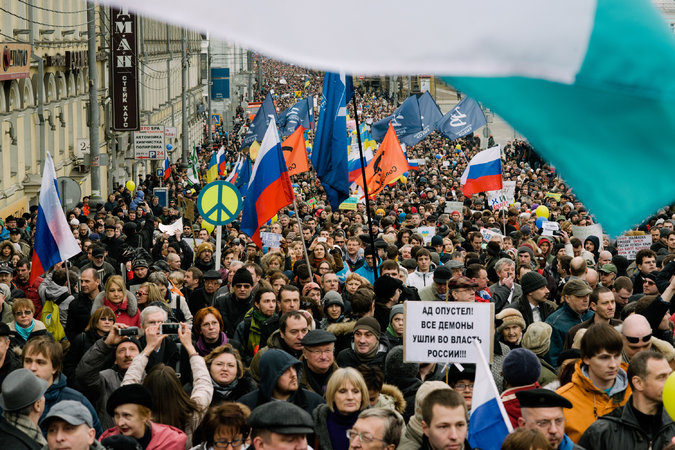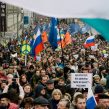
In Response to Ukraine, Russian Domestic Repression Increases
Publication: Eurasia Daily Monitor Volume: 11 Issue: 51
By:

While television has mostly been state-controlled for a long time in Russia, newspapers and Internet media have remained relatively free. That relative freedom appears to be one of the first casualties in the Kremlin’s invasion of Ukraine as it seeks to prevent a Maidan-style protest in Moscow (see EDM, March 13) by cracking down on dissent at home. Polls show that a majority of Russians support the introduction of Russian forces into Ukraine and the referendum on independence on the Crimean peninsula (https://korrespondent.net/world/russia/3318855-pochty-80-rossyian-podderzhyvauit-vkhozhdenye-kryma-v-sostav-rf-opros-). Putin’s popularity has certainly benefitted—just as it had following the Russian-Georgian war in 2008. However, a small but vocal minority in Russia is opposed to the country’s actions on the international stage, which are turning the country into a pariah. And the Kremlin has moved to crack down on these Russians who disagree with the official narrative promulgated by the state media.
First, the Kremlin has sought to crack down on the nascent anti-war movement in Russia. In Moscow, on March 7, there was a protest against the war led by civil rights activist Lev Ponomorov, which involved some 500 people. In response, the Kremlin simultaneously arranged a rally “in support of the residents of Crimea,” which attracted 50,000 participants (https://www.newsru.com/russia/07mar2014/actions.html). Hundreds of the anti-war protestors were detained by police as well. In St. Petersburg, 75-year-old Igor Andreyev was fined 10,000 rubles ($275) for holding up a banner that read “Peace to the world” (https://www.newsru.com/russia/06mar2014/andreev.html).
The next stage for the anti-war movement came on Saturday, March 15, with a Kremlin-sanctioned march “against the policies of Russian power in Ukraine.” The march attracted an estimated 30,000–50,000 participants (https://grani.ru/Politics/Russia/activism/m.226684.html). The Facebook page for the march showed that 57,000 people had been invited (https://www.facebook.com/events/807275709299709/). The Kremlin’s decision to allow the protest should probably be viewed as a calculated “safety valve,” which can let off steam for the anti-war demonstrators. Yet, if future such protests are met with heavy-handed policing by the authorities, the potential outcome could exacerbate the threat of a Maidan-style movement developing inside Russia.
Second, the Russian traditional print media has published works critical of Russia’s undeclared invasion of Crimea, and the Kremlin has responded by prosecuting individual writers. In Vedomosti, for instance, Professor Andrei Zubov of the Moscow Institute for International Relations published an article comparing Russia’s annexation of Crimea to the 1938 Anschluss, which brought Austria into Nazi Germany (https://www.vedomosti.ru/opinion/news/23467291/andrej-zubov-eto-uzhe-bylo). Zubov was allegedly told to resign or face termination from his job, although his colleagues immediately rallied to his side and prevented the threat from being carried out. Similarly, the editor of Nezavisimaya Gazeta Konstantin Remchukov spoke out against the policy of holding a referendum in Crimea and the “massive propaganda on federal channels” (https://www.echo.msk.ru/programs/personalno/1275506-echo/q.html). In turn he was immediately branded a “traitor” and a “fascist.”
Third, the Kremlin is cracking down on expressions that go against the official party line on the Internet. The free use of the Internet was pivotal in bringing about revolutions throughout the Middle East. Certainly, critics of the government are using the Internet to challenge the official narrative coming from the Kremlin. In his Livejournal blog for instance, the leading opposition figure Alexei Navalny wrote that “in Ukraine there was a popular uprising against corrupt and thieving power” and drew an explicit comparison between Russia and Ukraine asking “why is Putin going so wild over events in Ukraine?” (https://navalny.livejournal.com/914090.html). Although Navalny is under house arrest and banned from using the Internet, his Livejournal page keeps being updated. Having failed to silence Navalny through these milder means, Rozkomnazdor added Navalny’s blog to the federal list of banned websites on the evening of March 13, along with other popular sites Grani.ru, Kasparov.ru, and the “Daily Journal” (https://www.mk.ru/politics/news/2014/03/14/998290-deputat-poprosivshiy-zakryit-blog-navalnogo-bolshe-ne-zhzhuzhit.html). In another case, the editor of the news website Lenta.ru, Galina Timochenko, was sacked over an interview with a Ukrainian far-right ultranationalist Andreem Tarachenko. She was warned that the interview incited ethnic hatred. The new editor of the website Alexei Goreslavskii promised that the editorial stance of the online journal would not change, although Russia’s journalistic community protested the move as “censorship” (https://lenta.ru/articles/2014/03/13/lenta/). Monitors at Moscow’s SOVA center have long warned that the vague articulation of article 282 of the Russian Federation’s constitution (banning incitement to ethnic hatred on racial or religious grounds) is open to abuse.
The situation in Crimea is thus fraught with danger for the regime in the Kremlin. Although it does not want to tolerate dissent in any form lest the criticisms chip away at its legitimacy, at the same time overt repression will almost surely generate the outcome it seeks to avoid. After all, it was the shooting on the Maidan in Kyiv that turned a peaceful protest against the regime of Viktor Yanukovych into a full-blown revolution. It is perhaps testimony to the powerful emotions generated by the invasion of Ukraine that the regime’s complex repressive apparatus is not able to cope with the levels of criticism already circulating in Russia. Moreover, Moscow is discounting the long-term boost to ethno-nationalist extremism movements that the events in Ukraine are generating (https://jamestownfoundation.blogspot.com/2014/02/russian-neo-nazis-react-to-events-in.html; https://www.themoscowtimes.com/news/article/crimea-vote-galvanizes-separatists-in-russia/496142.html). With the costs of intervention mounting, Putin looks increasingly likely to lose his gamble in Ukraine.




